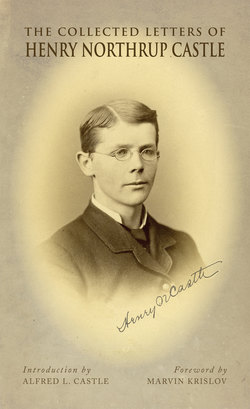Читать книгу The Collected Letters of Henry Northrup Castle - Henry Northrup Castle - Страница 7
На сайте Литреса книга снята с продажи.
FOREWORD
ОглавлениеGeorge Herbert Mead began corresponding with Henry Northrup Castle in the summer of 1883, shortly after they graduated from Oberlin College. During their time on our campus, the two had become close friends. They edited the Oberlin Review, our student newspaper, fueled each other’s deep interest in literature and culture, and delighted in debating philosophy with Professor John M. Ellis, and with James H. Fairchild, Oberlin’s third president (1866—89). In a letter to his parents in the fall of 1882, Castle wrote, “I wonder what Prof. Ellis thinks of George and myself. He must regard us as a perfect nuisance, because hardly a day passes in Mental Philosophy when we do not start a discussion with him. We have lots of fun, too, asking questions of Pres. Fairchild, who has our Bible class.”
I am certain neither teacher was surprised when Mead and Castle went on to become nationally prominent thinkers and philosophers. Since Oberlin’s founding in 1833, its graduates have been expected to employ their education and energies to bring about positive social changes benefiting all humankind. That ethos can be traced back to the teachings of John Frederick Oberlin, the extraordinary French pastor whose belief in enlightened education as the path to social improvement, economic betterment, and democracy inspired our founders. Belief in the uplifting power of education inspired Mead, Castle, and John Dewey to become pioneers of progressive education and influenced Harriet Castle, Henry’s sister and a fellow Oberlin grad, to spearhead the free kindergarten movement in Hawaii after Henry’s tragic death in 1895.
At Oberlin, George Mead and Henry Castle’s friendship grew from their shared love of learning and insatiable intellectual curiosity. As undergraduates, they read, studied, discussed, wrote, and developed a driving scholarly ambition. They learned to cherish the life of the mind, to think and reason independently, to teach themselves and others, and to accept responsibility for improving society. Through their thinking, teaching, and writing they passed those values on to generations of young people. Henry Castle’s letters offer an intimate and important perspective on how their friendship and ideas grew and evolved. It is the hope of all of us at Oberlin College that the republication of the letters of Henry Northrup Castle will help educate and inspire new generations of students, teachers and scholars, in Hawaii and the world.
Marvin Krislov
President, Oberlin College
Oberlin, Ohio
